Best DJ Turntables (Updated Aug 2022)
Vinyl will never die! 10 years ago, you might have seemed like a lunatic for suggesting this – it seemed all but inevitable that digital formats will fully take over and the lively vinyl market would be all but deleted from the mainstream.
However, this couldn’t be further from the truth. Vinyl has resurged massively, vinyl sales have surged by over 1000% according to some survey results!
It now firmly looks like vinyl will truly never die and vinyl turntables are making their way back into clubs worldwide. Not only is true vinyl skill an undebatable hallmark of DJ quality, but it also sounds great and introduces creative spontaneity into DJ performances. Also, vinyl is absolutely the chosen format for scratchers and mixers.
DVS has also contributed to the resurgence of vinyl by combining the flexibility of digital formats with the unequaled feel and style of the turntable.
| Name | Feature Highlights | |
|---|---|---|
| Technics SL-1210 | Adjustable Braking Speed; No-Click Pitch Control; Quartz Direct-Drive; 33 1/3 and 45 RPM Speeds; | PRICING |
| Panasonic Technics SL-1210GR | Builds on highly acclaimed 1200s design with super-modern components, 33, 45 and 78 BPM selectable, Incredibly smooth faders | PRICING |
| Pioneer PLX-1000 | Class brushless motor and other electronics, Wide range pitch faders, Minimalist and familiar design | PRICING |
| Pioneer PLX-500 | USB for PC/DVS connection, Excellent components, Great build quality | PRICING |
| Reloop – RP8000S | Digitalized controller with extra functions; Tempo display; USB tether mode; Optimized for Serato | PRICING |
| Numark – TT250 USB | Cheap for a quality deck; USB enabled; Comes with heads and needles; Classic design | PRICING |
| Audio Technica – LP120 USB C | 33, 45 and 78 RPM modes; USB recording with bundled software; Classic design; Wide range pitch fader | PRICING |
| Audio Technica AT-LP1240 | XP5 DJ Cart and HS1 Headshell Included; USB Output to Mac & Windows Computers; Rugged Construction; | PRICING |
| Reloop – RP7000 Quartz Driven Direct Drive | User-Friendly Control Layout; High-Torque Direct Drive Motor System; Tempo Control with Variable Width Levels; | PRICING |
| Stanton – ST150 Digital | Exceptional deck; Simple but high in performance; Super strong exterior | PRICING |
Vinyl Deck Features
Before continuing, let’s give a brief rundown on the basic features of a vinyl deck.
Motor/Drive
The motor is the central component of the deck. Think how many times that platter has to spin, you’re talking about thousands of times over a single set, hundreds of thousands over a lifetime, maybe even gaining on millions!
In short, then, the motor needs to be extremely powerful, durable and hardwearing. Modern turntables often use brushless motors that perform better whilst wearing out much slower than their brushed counterparts.
Arm
Deck arms are either bent into an ‘S’ (as in classic designs, e.g. Technics) or straight. There is considerable debate over whether either is better than the other and for what. Some people swear straight arms are better for scratching but many claim there is no tangible difference.
Platter
The platter carries the vinyl and above anything else, it has to be super-straight and balanced to absolute precision. The best platters will be completely balanced throughout.
Controls
Aside from a vinyl deck’s mechanical components, you’ll have a selection of controls for:
RPM: Always 33 and 45 RPM but often also 78 for older vinyl
Pitch: A pitch fader for pitch/tempo adjustment
Pitch Range: Pitch can be adjusted within a precision range of 8% or below or a wide range extending as far as 50% in some cases!
Start/stop: Some decks have two pairs of buttons to accommodate both horizontal or vertical deck positioning.
The Decks
So, what about the very best vinyl turntables? There are actually a lot to choose from! This hasn’t always been the case though, go back a few decades and you’ll find just one name: Technics.
1. Technics 1200 Series
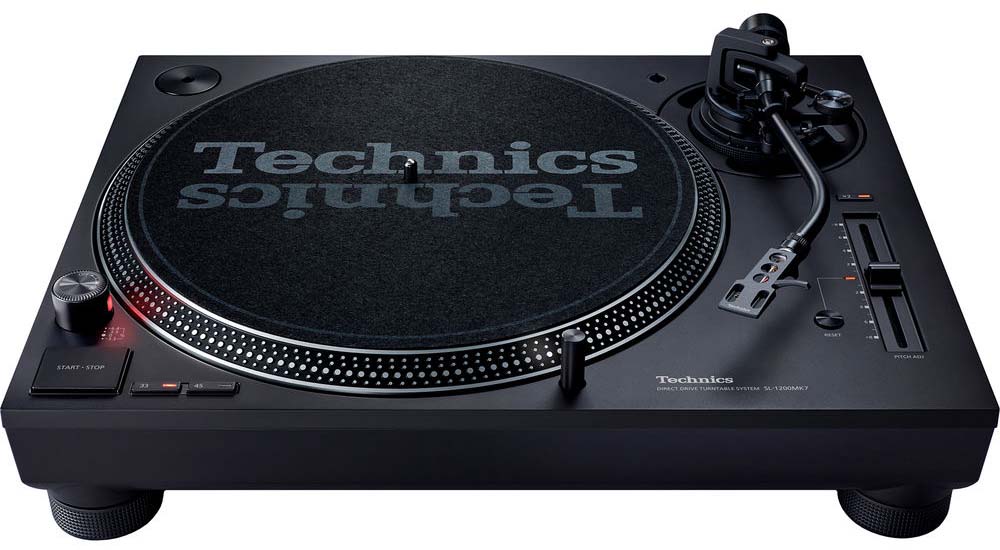
These are the ones which started it all. There are very few pieces of audio tech which are as iconic as the Panasonic Technics SL-1200 series. Sometimes simply referred to as ‘Technics’, these decks are more than a couple of decades old but they’re still viewed as an industry standard and they still hold remarkable value even despite the number of new turntables brought out since.
These decks are available second hand only and you may find prices vary between a couple hundred dollars to in excess of $400. There are a variety of different models, many with slight modifications. The Mk.II is considered the mainstay of the range.
HOWEVER…Panasonic recently announced something that so many were begging to hear, the introduction of the new modern Technics, the SL-1210GR.
2. Panasonic Technics SL-1210GR
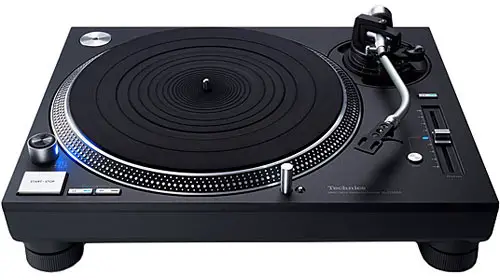
Bottom Line: An extremely high quality updated version of the legendary turntable and the new industry standard. The best if you can afford them at over $1000 a piece!
Panasonic’s beautiful new Technics update took the industry by surprise. The good news is this turntable meets its billing. The bad news is that it is extremely expensive!
This turntable packs a new super-modern brushless motor for ultra-slick timing, durability and start/stop accuracy. It’s unparalleled in terms of the painstaking effort taken to develop each and every aspect of this controller for long periods of pro use. Everything from the internal connections to the external design of the tone-arm, buttons, platter, everything is simply pristine.
Couple this turntable with some Ortofon Concorde’s or similar cartridges and needles and you’ll have an exquisite turntable capable of anything from high-end hifi use to battle DJing.
Pros
- Builds on highly acclaimed 1200s design with super-modern components
- 33, 45 and 78 BPM selectable
- Pitch range can be doubled
- Incredibly smooth faders
Cons
- Expensive!
3. Pioneer PLX-1000
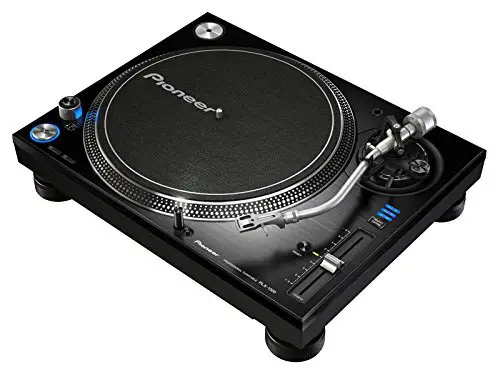
Bottom Line: Typically Pioneer in looks, feel and design, this top quality turntable is a head-turner and it packs pro components that are sure to last severe and long term use.
Pioneer was characteristically quick to react to the surge in vinyl popularity, bringing out their very own turntable to take over the high-end market. The PLX-1000 is their flagship vinyl turntable and it’s a beast! Clearly modeled on the Panasonic Technic range which changed the shape of vinyl turntablism, this deck is distinctly Pioneer with an awesome brushed black finish, extremely durable components and pristine layout and finish.
It has an extremely high-torque high-end brushless motor which has been expertly engineered to be extremely strong throughout prolonged used. The headlines of this deck are simply its expert and highly robust build. It doesn’t have USB and is connectable only via RCAs, either directly to phono ports on mixers or interfaces if you’re using DVS. The multi-pitch tempo control allows you to adjust within the regions of +/- 8, 16 or even 50, allowing for extreme pitch variation.
Pros
- Looks awesome
- Class brushless motor and other electronics
- Wide range pitch faders
- Minimalist and familiar design
Cons
- No innovative features (both a pro and con)
4. Pioneer PLX-500
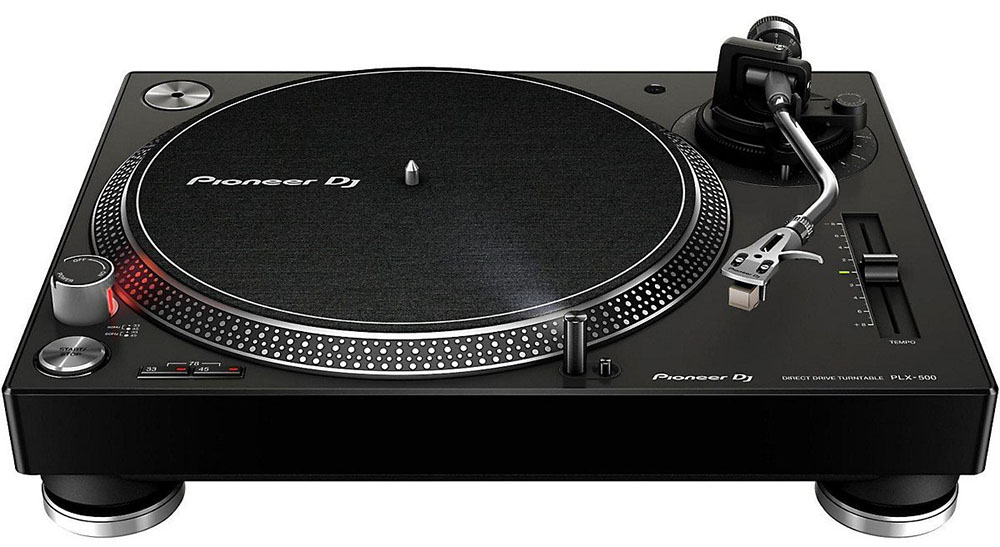
Bottom Line: Gains USB but loses some of the pro functionality of the PLX-1000, but for a lower price.
In a rather confusing move by Pioneer, the PLX-500 introduces USB to make digital recordings of your files and also allows for connection to RekordBox for DVS use. It does, however, lose some of the pro level components of the PLX-1000 and thought Pioneer are relatively non-specific, it seems that the motor is downgraded. On the plus side, it’s cheaper (as well as coming with extra functions).
This deck is actually pretty cheap for Pioneer equipment and thought it’s touted as an intermediate or beginner deck, it easily packs features solid enough for demanding DJ use.
Pros
- Cheap for Pioneer
- USB for PC/DVS connection
- Excellent components
- Great build quality
Cons
- Motor downgraded from the PLX-1000
5. Reloop – RP8000S
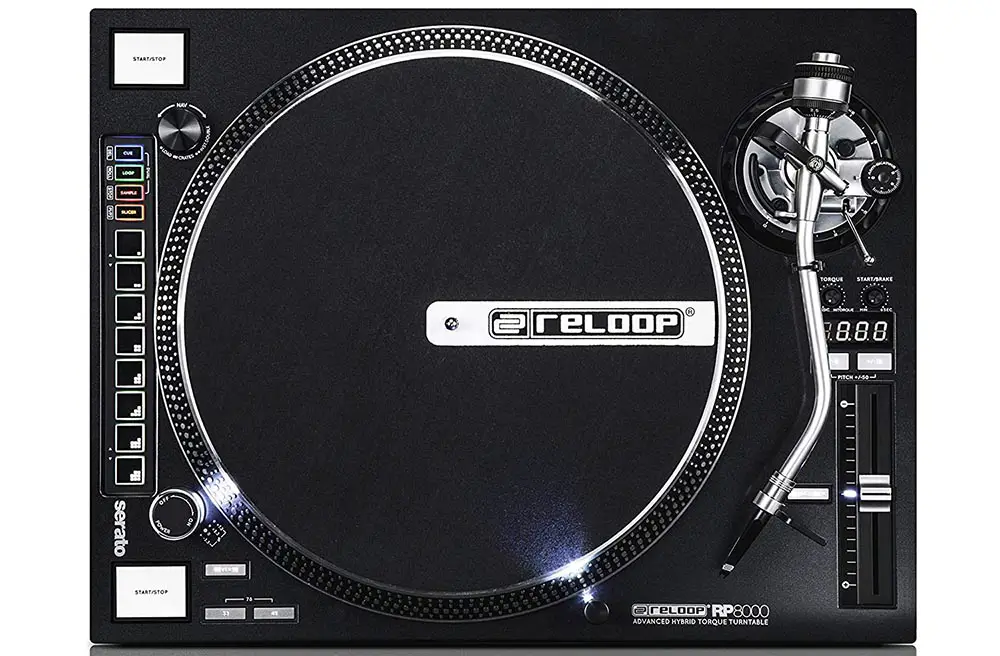
Bottom Line: Innovative digital features cross this deck with a CDJ for DVS use, making it super flexible.
Reloop has quickly ascended the DJ tech ranks to become a leading light in creating high-end yet innovative DJ tech. The RP8000s features a straight arm, optimizing it for scratchers. Straight arms are thought to improve tracking when sudden movements are made on the deck. The Reloop is a USB compatible deck and comes with its own cue, sample, loop and slicer controls for use with DJ software like Serato DJ. This is awesome as it really allows vinyl DJs or scratchers to tap into some of the convenience of CDJs or controller decks.
The Reloop comes packed with tech to make life easier for DJs, including the ability to connect 4 decks together to just the single USB port. There is even a rotary encoder for scrolling your music library directly from the deck, and a digital display to show you tempo information about your track!
Pros
- Digitalized controller with extra functions
- Tempo display
- USB tether mode
- Optimized for Serato
Cons
- None
6. Numark – TT250 USB
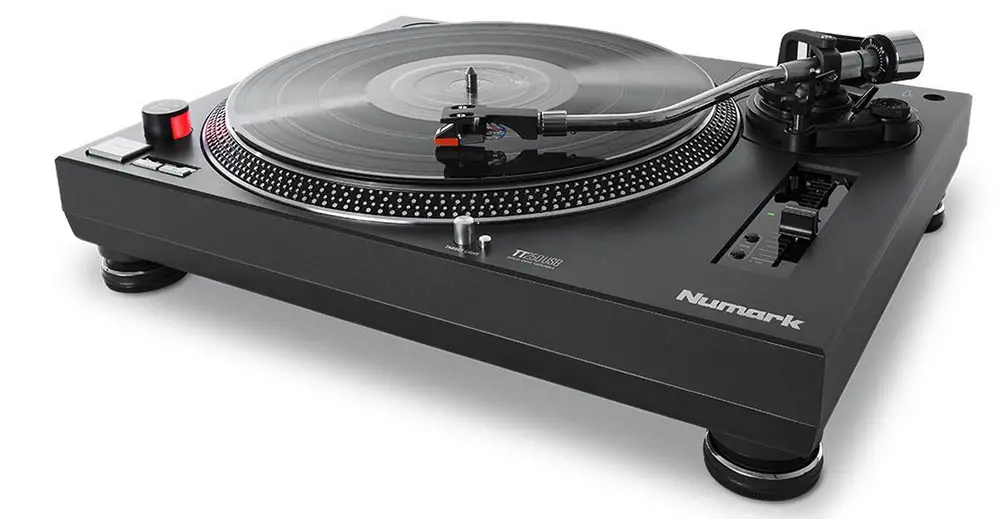
Bottom Line: Well-priced, well-designed and reputable to the core, this Numark deck is an excellent solution for DJs and hifi users.
Numark has been one of the most famous providers of mid-range and budget DJ equipment and they’re continuing to deliver awesome products at remarkable value. This is a basic deck with a high-end motor which provides direct drive power to the platter. With a classic pitch-fader and adjustable arms, feet and platter height, this deck provides all the functions you need for vinyl DJing or scratching. The deck even comes with good quality needles and heads out of the box.
One innovative feature to this deck is that it has a USB connection so you can convert vinyl to digital files with bundled software. That’s pretty awesome and makes this an ideal multi-purpose deck for hifi and DJ use. It also has a remote port which when coupled with a compatible mixer allows for automatic vinyl play when the fader is triggered on the mixer – ideal for radio DJs.
Pros
- Cheap for a quality deck
- USB enabled
- Comes with heads and needles
- Classic design
Cons
- Lacks innovative functions
7. Audio Technica – LP120 USB C
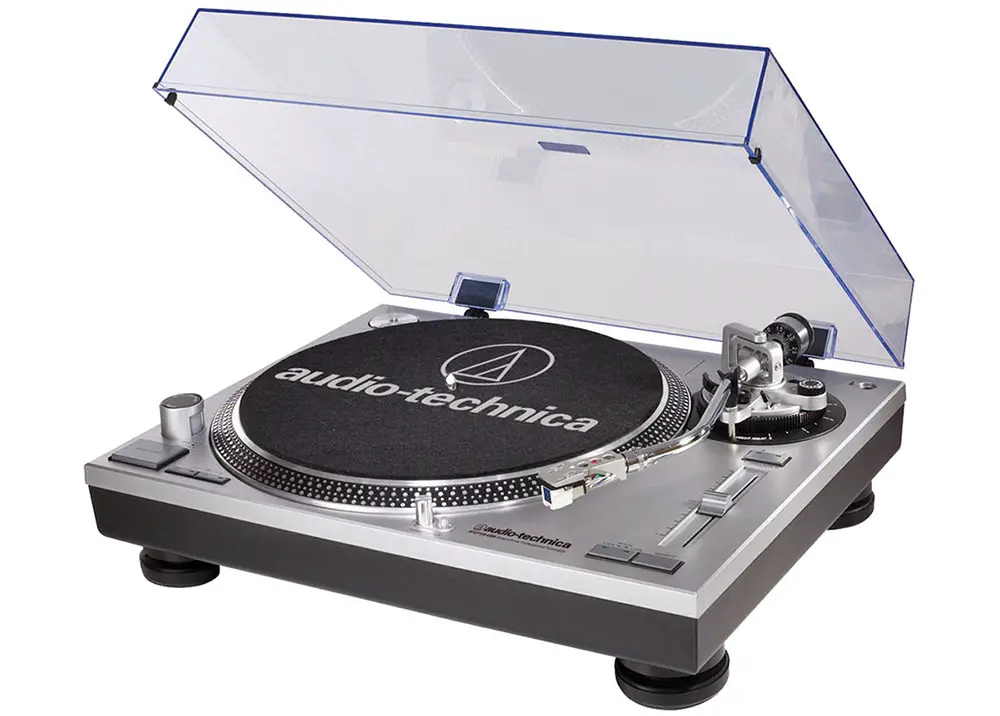
Bottom Line: Designed largely for home hifi use, this deck combines USB recording features with an awesome pro design which makes it suitable for DJ use also.
This is another deck which combines commercial hifi features like USB recording with components strong enough to endure DJ use. This deck’s USB recording feature is enabled through Audacity Production Software which comes bundled. This deck also plays at the old school 78 RPM which suits particularly old vinyl. This turntable also makes use of its own pre-amp to plug directly into speaker equipment that lacks phono/line level switches.
This deck combines a high-class, strong and durable motor with some great features which make it ideally suited to both DJ and hifi use. It has a pitch fader adjustable between +/- 10 or 20 percent for mixing vinyl at greatly varying tempos. It comes boxed with cartridges, needles and heads so you won’t need to add your own.
Pros
- 33, 45 and 78 RPM modes
- USB recording with bundled software
- Classic design
- Wide range pitch fader
Cons
- Not very laid out for battle DJs
8. Audio Technica – ATLP1240 USB
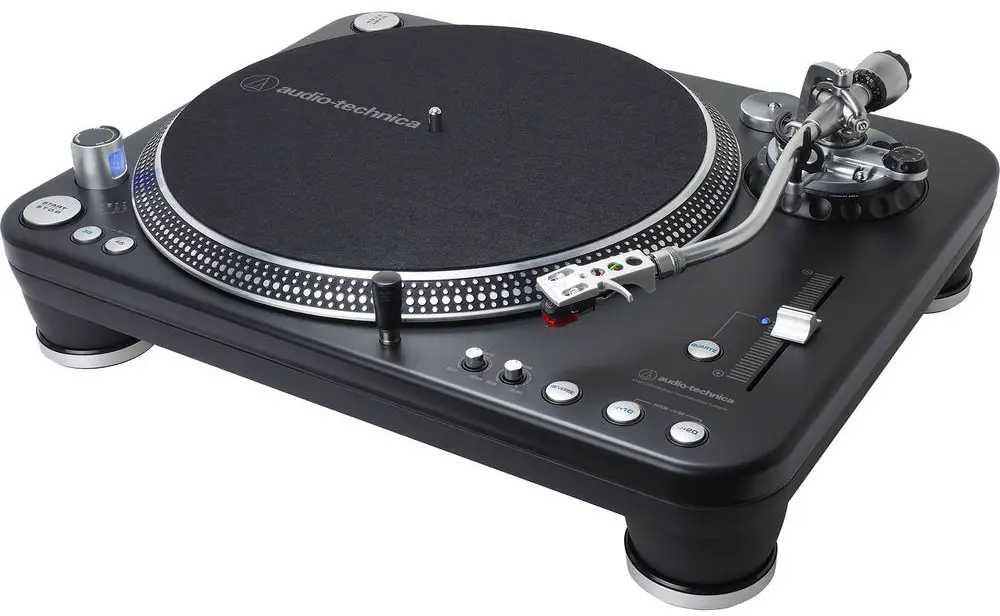
Bottom Line: Superb turntable with exceptional performance, top components and awesome functions. An awesome pro level entry into the DJ turntable market.
This is a class-leading deck that comes at the top of Audio Technica’s range. It’s extremely well designed and was allegedly tested to its limits to ensure its long-term durability and robustness both when used as a hifi turntable and when subject to the most demanding DJ use.
This turntable features a very strong modern high-torque motor for starters, is made from largely steel and aluminum, with an aluminum platter. It’s packed with pro features that have made it an extremely popular choice in professional venues and studios worldwide.
This turntable features a well-made target light, a pitch-control slider that is built for precision beatmatching when mixing at tiny increments and also a quartz lock for bypassing pitch control entirely and zeroing at 0 percent. The deck works across 33, 45 and 78 RPM to allow for the playing of virtually all existing vinyl.
It has two start/stop buttons and adjustment controls for how quickly the platter breaks – this allows you to position the deck vertically for battle-mixing or scratching. It has a built-in phono amp also, for direct attachment to equipment which won’t boost the signal to line. To top it off, it has a USB output port for vinyl/digital conversion. It’s a top deck from a top manufacturer for pro use.
Pros
- Exceptional build and components
- 33, 45 and 78 RPM selectable
- Faders designed for DJ use
- Dual start/stop for battle mixers
Cons
- None
9. Reloop – RP7000 Quartz Driven Direct Drive
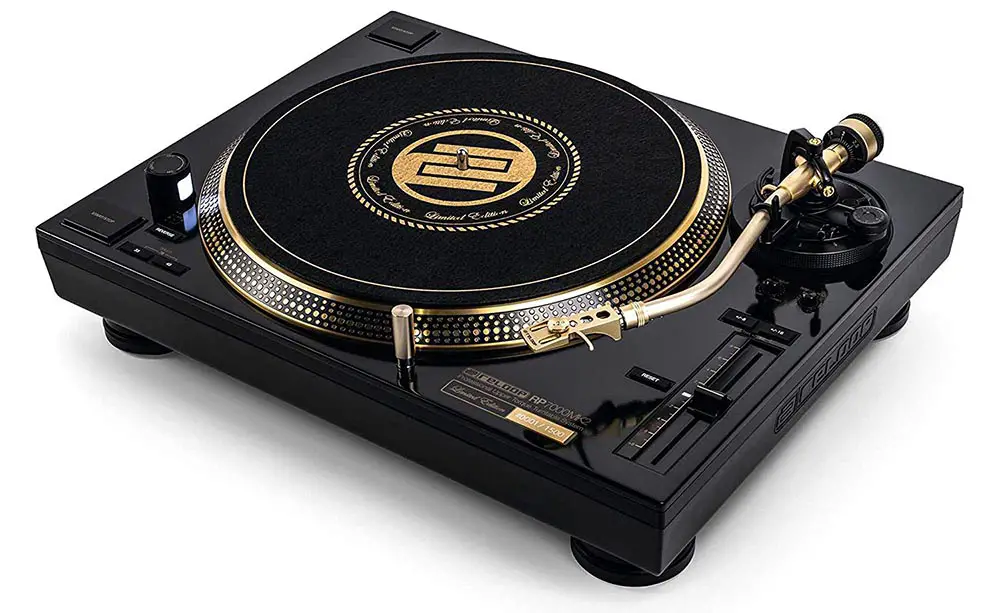
Bottom Line: Insanely well tuned pro DJ turntable. Minimalist with exceptional components, this turntable keeps things streamlined.
This deck strips down the cool innovative features of Reloop’s other products to offer a super-streamlined, highly regarded and extremely well-built deck for pro use. It’s very similarly designed to the original Technics SL-1200, which will tick a box for many. It doesn’t make any real attempt to throw caution to the wind with crazy and new additions but instead builds upon that rock-solid base with modern components and up-to-date materials. This deck contains a highly accurate digital pitch-range which covers 8, 16 and 50 percent ranges for precise or extreme pitch bending.
Layout wise, it has dual start/stop for battle/scratching positioning and start/stop or brake speed adjustable between 0, 2 and 6 seconds. It has a safety on/off button to prevent accidental turn-offs, the pitch slider is superbly smooth and features a quartz lock button for zeroing at 0%. The deck has its own line amps so it can connect straight to mixers without phono inputs. It’s geared up for pro use!
10. Stanton – ST150 Digital
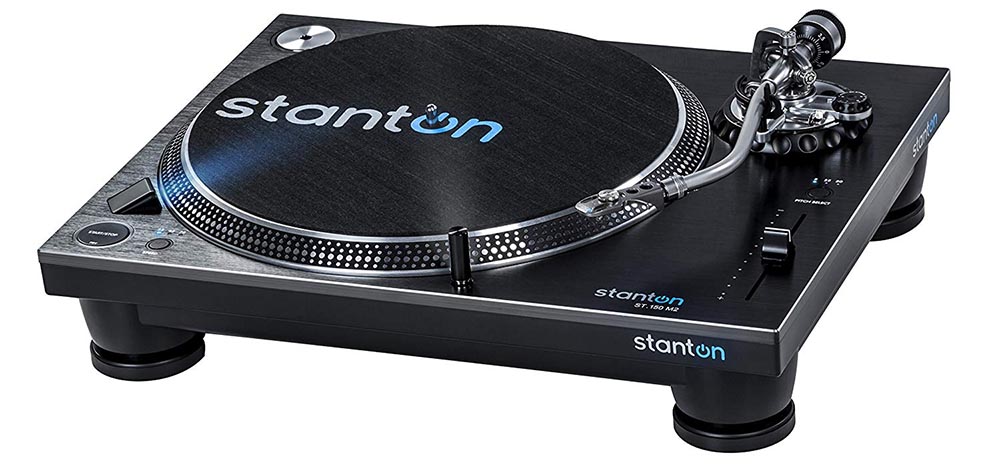
Bottom Line: A legendary turntable in its own right which has been about for quite some time. Highly regarded by DJs from all corners of the scene.
This awesome pro-level DJ turntable was a competitor to Technics back in 2005 when it was first released. It’s been well known amongst turntablists ever since and has quickly become immortalised in the halls of fame for DJs and scratchers. The ST150 had its own distinct design that diverged from the 1200s and their copycats and it still holds its own as a pro deck today.
This Stanton deck added the reverse switch and large-range pitch shifts which are now common on decks. With top-level components including super-strong motors, extremely durable arms, platters and feet and a super-strong exterior (weighing in at 42lbs!), these decks are tricked up for pro use. These controllers also feature dual start/stop buttons for vertical positioning during battle or scratch sets, 33, 45 and 78 RPM rotation settings and easily replaceable target lights. Finally, these awesome decks come with great quality cartridges and needles straight out of the box!
Pros
- Exceptional deck
- Simple but high in performance
- A real workhorse
- Super strong exterior
Cons
- Insanely heavy!
Conclusion
So, the wonderful world of vinyl! There are tons of awesome options here and they’ve all earnt their place in this top list. Every turntable here is built to a high spec and to varying degrees, they all inherit a fair amount of tech from the faithful par excellence of the Technics 1200s.
Which is the best? It’s extremely hard to say. The Reloop RP8000S makes an obvious appeal to those looking for a flexible digitalized deck which functions as both a vinyl deck and DVS-compatible deck with extra features.
The Technics 1210GR is a tremendous deck. It’s super expensive but it’s built to really shell out top performance year after year. Only time will tell if this deck meets the super-high bar set by the original 1200s but things are looking good right now.
The Stanton ST.150 MK2 is another proper workhorse and its reputability is easily equal to the original Technics. It combines a nearly indestructible chassis with awesome components – a proper serious deck for pro use.
Any of the others also ultimately superb – the standard here certainly is high!
You may also like: